Ann Martin - The Truth About Stacey
Здесь есть возможность читать онлайн «Ann Martin - The Truth About Stacey» весь текст электронной книги совершенно бесплатно (целиком полную версию без сокращений). В некоторых случаях можно слушать аудио, скачать через торрент в формате fb2 и присутствует краткое содержание. Жанр: Старинная литература, на английском языке. Описание произведения, (предисловие) а так же отзывы посетителей доступны на портале библиотеки ЛибКат.
- Название:The Truth About Stacey
- Автор:
- Жанр:
- Год:неизвестен
- ISBN:нет данных
- Рейтинг книги:4 / 5. Голосов: 1
-
Избранное:Добавить в избранное
- Отзывы:
-
Ваша оценка:
- 80
- 1
- 2
- 3
- 4
- 5
The Truth About Stacey: краткое содержание, описание и аннотация
Предлагаем к чтению аннотацию, описание, краткое содержание или предисловие (зависит от того, что написал сам автор книги «The Truth About Stacey»). Если вы не нашли необходимую информацию о книге — напишите в комментариях, мы постараемся отыскать её.
The Truth About Stacey — читать онлайн бесплатно полную книгу (весь текст) целиком
Ниже представлен текст книги, разбитый по страницам. Система сохранения места последней прочитанной страницы, позволяет с удобством читать онлайн бесплатно книгу «The Truth About Stacey», без необходимости каждый раз заново искать на чём Вы остановились. Поставьте закладку, и сможете в любой момент перейти на страницу, на которой закончили чтение.
Интервал:
Закладка:
Laine'sdoor was closed. A big sign said:
KNOCK BEFORE ENTERING.
I knocked.
"Who is it?"Laine called.
"It's Stacey."
No answer.
"Can I come in?"
No answer.
I went in anyway. I threw my duffel bag down on one of the twin beds.
Lainewas lying on the other bed, reading a book. She didn't look up.
I walked back to the door. "I just want you to know," I said as I started to close the door, "that I'm not any happier to be here than you are to have me. I wanted to stay in a hotel. In fact, staying with Cheryl would have been a picnic compared to this."
Lainefinally looked up from her book. "Stacey— "
But I stepped into the hall, slamming the door behind me. I could hear the adults in the living room, so I went into the guest room. It was the only place I could be alone.
Laineand I didn't speak all evening. I noticed, though, that she watched me very carefully, especially at dinner. But there wasn't much for her to see. I cleaned my plate. Dessert
wasfruit, which I could eat. When I needed to give myself an injection of insulin, I did it quickly in the bathroom. I'm not sure whatLaine was expecting that night, but I didn't faint or throw up, I was neither overweight nor underweight, and nobody gave me any special attention, food, orfavors .
I was as normal as she was, except that I had a disease called diabetes.
The next morning, my parents and I left for Dr. Barnes' clinic aroundeleven o'clock . We wanted to enjoy the city, so we decided to walk. We walked down Central Park West, with the park on our left, and then we turned ontoWest Sixty-Third Street .
The clinic was not far away. It occupied a suite of rooms on the ground floor of a tall, modern apartment building. Mom gave our names to a receptionist in the waiting room and we sat down on a hard couch. We were the only people there.
Fifteen minutes later, a nurse entered the room. She told my parents that Dr. Barnes would be with them shortly. Then she led me down a hall and into an examining cubicle.
And the tests began.
I was examined, poked, and prodded. Blood
wasdrawn. I was fed a specially prepared lunch and more blood was drawn. Then this woman holding a sheaf of papers asked me to do weird things like draw a picture of my family, make up stories about inkblots, and build towers of blocks. I ran on a treadmill and tried to do sit-ups and push-ups. I rode an exercise bicycle. At last I was given a written test. It might have been an IQ test, but I wasn't sure. Whatever it was, it looked long. My appointment with the other doctor was atfive o'clock , and I still hadn't even told my parents about it. At3:10 , I began to feel nervous. At3:20 , I began to perspire. But at3:30 , a nurse came to take the paper away. Whew! Just in time.
I was sent back to the waiting room. I had been at the clinic for four hours and I had not laid eyes on Dr. Barnes.
My parents had, though, and they looked a little confused. I took advantage of that. I spotted a coffee shop across the street from the building the clinic was in. "Let's go get something to drink," I suggested.
When we were seated in a booth, Dad said, "Well, tell us about your day, honey."
I did — briefly.
The waitress brought our order.
As Mom and Dad sipped their coffee, I said carefully, "You know, you guys were right about something."
"What's that?" asked Mom.
"That it's important to learn about diabetes and do everything we can to try to overcome it or live with it better. And so ... I've been looking into it myself."
"You have?" said Dad. "Good for you."
"Yeah.And I heard about this doctor, Dr. Graham. He's a big authority on childhood diseases, especially diabetes. He's done lots of research and he even started some organization to study diabetes."
Dad raised his eyebrows and nodded his head.
"The thing is," I said, "I have an appointment with him today. It's sort ofa. . . surprise. We're supposed to be at his office atfive o'clock ." I held out the letter fromCharlotte 's mother. "This is from Dr.Johanssen . I think you better read it now."
"What?" my mother started to say. "Honey, j_ "
"Just read it," I said. Dr.Johanssen had shown me the letter before she sealed it in the envelope, so I knew what it said. It explained that we had discussed this new doctor and that I had expressed an interest in seeing him
andhad asked Dr.Johanssen to help me get an appointment. It said that I had gone to her confidentially, which was why she hadn't contacted my parents personally. She wound up by praising the doctor's work, apologizing to Mom and Dad for any inconvenience, and offering to talk with them when we returned toStoneybrook .
My parents read the letter together, frowning.
"Stacey, I'm not quite sure what to think of all this," said Dad, when the letter had been returned to the envelope.
"I thought you'd be pleased," I said, although that wasn't quite true.
"Well, we are," said Dad. "We're just — we weren't expecting this. We don't know how expensive he's going to be. We don't know anything about him. I wish you'd discussed this with us before you made an appointment."
"You make appointments for me without asking me first," I pointed out.
"True . . ." said Mom. "Dr. Graham. His name sounds familiar. . . . Philip Graham. I think I've heard about him or read about him." She began to look impressed. "He's supposed to be excellent, but very busy and almost impossible to see. You were lucky to get an appointment, Stacey."
"Listen," I said hastily, since Mom seemed so impressed, "his office is way across town atEast Seventy-Seventh Street andYork Avenue . We better get going."
Dad looked at his watch."We certainly better." He paid the man at the cash register, and we hurried outside and hailed a cab.
I scrambled into the backseat between Mom and Dad. I crossed my fingers.So far, so good.
Dr. Graham's office looked just the way I thought the office of a children's doctor should look. The waiting room was small andcozy , with two big, dumpy couches and lots of child-size chairs. On a little table by a window were/ some puzzles, a stack of picture books, and several copies of Cricket magazine. In a big bin were trucks, cars, dolls, and other toys. I sat down with the latest issue of Seventeen, and began to read while Mom spoke to the receptionist. In a moment, Dr. Graham himself came out. He was a tall black man with sparkling eyes and a deep voice. I liked him right away.
"Well, Stacey," he said, shaking my hand, "I'm glad to see you. You're my last patient today. These must be your parents."
Mom and Dad and the doctor introduced themselves while Dad tried to apologize for my setting up the appointment without telling them about it.
Dr. Graham said he didn't mind at all. Then he ushered us into his office, which was every bit as fancy and as full of diplomas as I could have hoped. "I'm not going to examineSta-cey ," he said. "This is a consultation only. I just want to ask some questions."
Some questions! He asked a billion. He asked about my birth, my health before the diabetes was discovered, the course of the disease, and how we were treating it. He asked about the doctors I'd seen, and my new doctor inSto-neybrook . He asked me how I was doing in school, how I had adjusted to the move, and whether I was making friends. Finally, he asked my parents to leave the office, and then he asked me some personal questions about how I felt about my doctors, my disease, and even Mom and Dad.
We talked forever, and he wrote down everything I said on a pad of yellow paper. Then he called my parents back into the office.
"Well," Dr. Graham said to them, "you must be very proud of your daughter. I'm sure you feel lucky to have her."
My parents nodded, smiling. "In more ways than one," added Mom.
Читать дальшеИнтервал:
Закладка:
Похожие книги на «The Truth About Stacey»
Представляем Вашему вниманию похожие книги на «The Truth About Stacey» списком для выбора. Мы отобрали схожую по названию и смыслу литературу в надежде предоставить читателям больше вариантов отыскать новые, интересные, ещё непрочитанные произведения.
Обсуждение, отзывы о книге «The Truth About Stacey» и просто собственные мнения читателей. Оставьте ваши комментарии, напишите, что Вы думаете о произведении, его смысле или главных героях. Укажите что конкретно понравилось, а что нет, и почему Вы так считаете.












